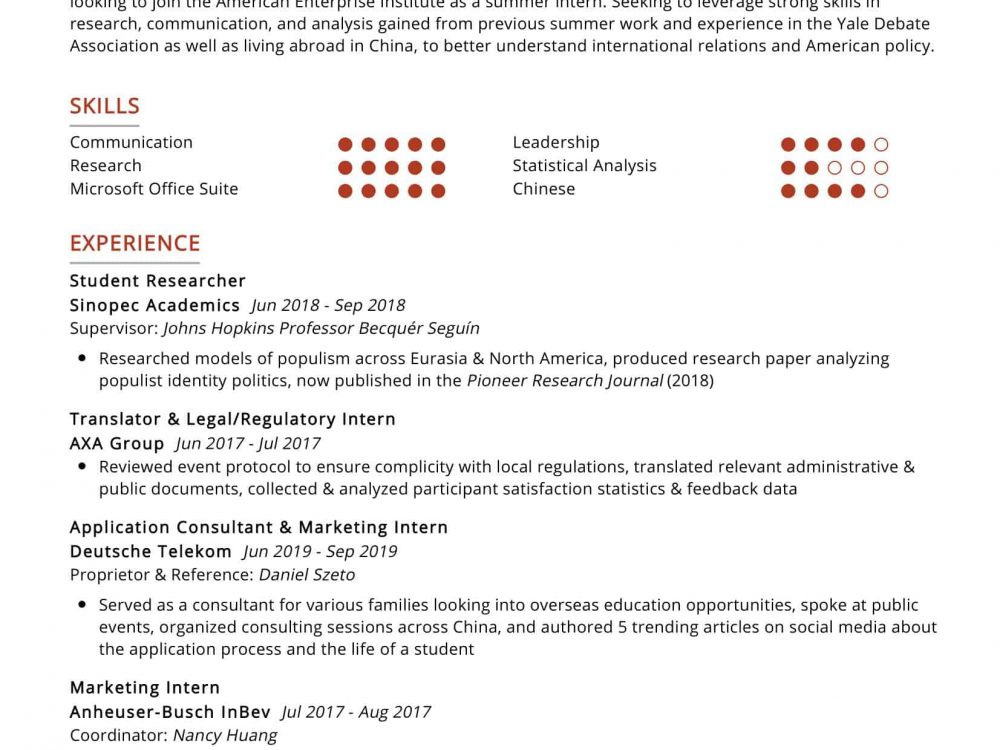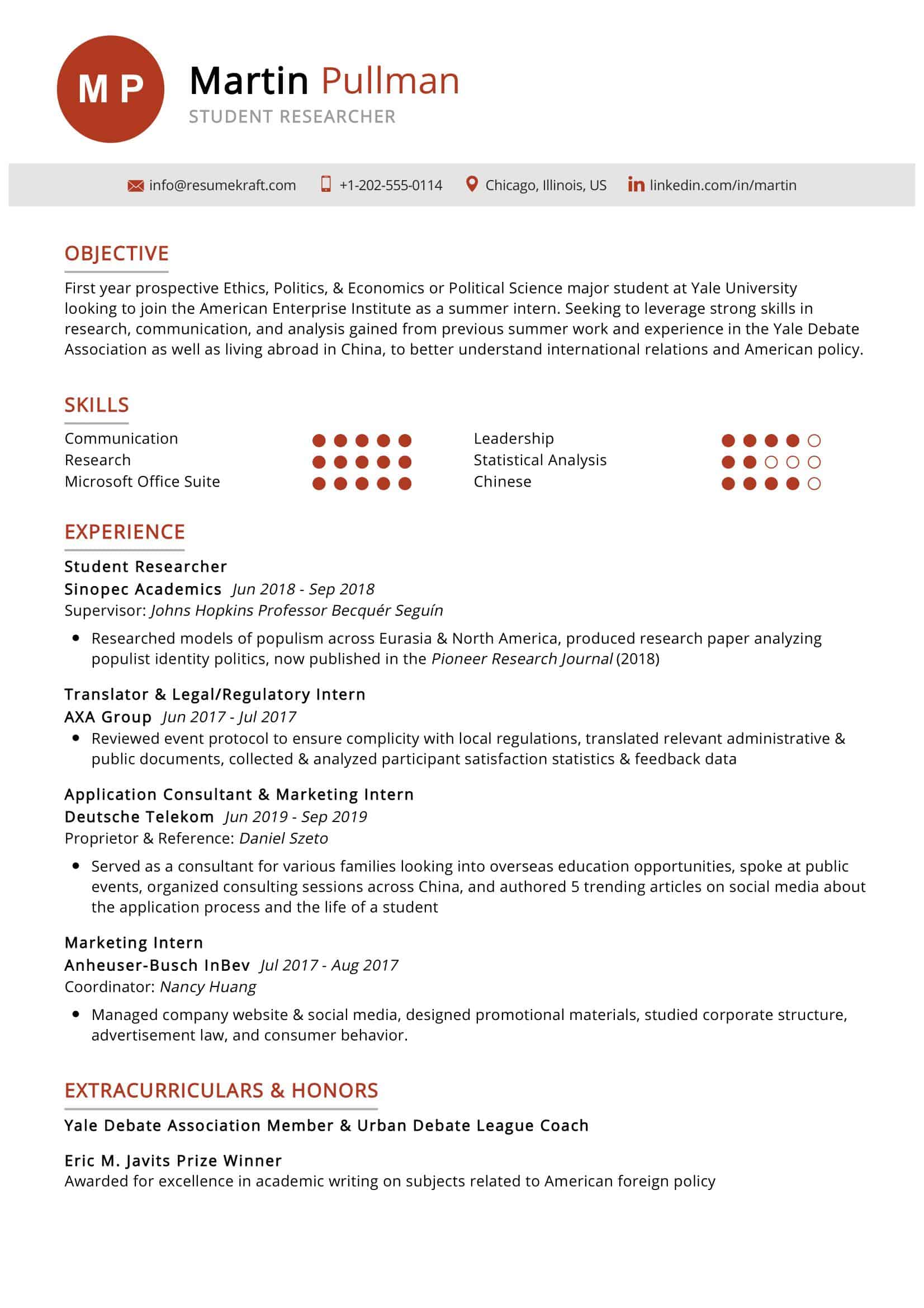Are you a Student Researcher by profession and looking for an exciting career? We have good news for you! use our professional Student Researcher Resume Sample. You don’t have to start writing from scratch. Just click “Edit Resume” and modify it with your details. Update the template fonts and colors have the best chance of landing your dream job. Find more resume samples.
Student Researcher Resume Sample
Martin Pullman
Student Researcher
Summary
First-year prospective Ethics, Politics, & Economics or Political Science major student at Yale University looking to join the American Enterprise Institute as a summer intern. Seeking to leverage strong skills in research, communication, and analysis gained from previous summer work and experience in the Yale Debate Association as well as living abroad in China, to better understand international relations and American policy.
Skills
Work Experience
Student Researcher
Sinopec Academics
Supervisor: Johns Hopkins Professor Becquér Seguín
- Researched models of populism across Eurasia & North America, produced research paper analyzing populist identity politics, now published in the Pioneer Research Journal (2018)
Translator & Legal/Regulatory Intern
AXA Group
Reviewed event protocol to ensure complicity with local regulations, translated relevant administrative & public documents, collected & analyzed participant satisfaction statistics & feedback data
Application Consultant & Marketing Intern
Deutsche Telekom
Proprietor & Reference: Daniel Szeto
- Served as a consultant for various families looking into overseas education opportunities, spoke at public events, organized consulting sessions across China, and authored 5 trending articles on social media about the application process and the life of a student
Marketing Intern
Anheuser-Busch InBev
Coordinator: Nancy Huang
- Managed company website & social media, designed promotional materials, studied corporate structure, advertisement law, and consumer behavior.
Education
Yale Debate Association Member & Urban Debate League Coach
Eric M. Javits Prize Winner
Awarded for excellence in academic writing on subjects related to American foreign policy
Languages
- French
- English
- German
- Chines
Career Expert Tips:
- Always make sure you choose the perfect resume format to suit your professional experience.
- Ensure that you know how to write a resume in a way that highlights your competencies.
- Check the expert curated popular good CV and resume examples
Student Researcher Resume with Writing Guide
Students are the next generation of workers, and it’s more important than ever that they are ready for the challenges ahead. In this post, we’re going to walk you through how to write a resume that will set you apart from the pack. It doesn’t matter what style of resume you have or what your experience is; we’ll cover all kinds and levels of expertise in order to make sure no student leaves without an exceptional document.
To get started, let’s look at the basics. There are many different types of resumes, and you’ll need one that best represents your skills and experience. In general, however, casual resumes are best if your experience is limited or if you do not have a degree. These are more freewheeling and tend to be more informal than traditional resumes. We’d recommend these for students who have interned at companies or participated in extracurricular activities in high school or college.
Student Researcher Resume Writing Guide:
- The Objective
The objective is the title of your resume. It serves as a short statement about your skills and experience, without taking too much time (not more than 2-3 sentences). In a traditional resume, it is usually the second paragraph. For a casual resume, it can be the first thing you do. - Biographical Information
The second thing to do is to fill in all of your personal information under “Professional Experience. ” This includes your address, phone number, email address, and the school or company you’re currently attending. - Education History
Next up is your education history. Include all college degrees you’ve earned and honor societies or extracurricular activities you’ve participated in. Be sure to fill in all of the details for each item so that a potential employer will know exactly what kind of commitment you can bring to a job. - The Resume Objective
This is one of the first things to write on your resume. It may change as you gain experience, but the first thing you should do is impress potential employers with all of your skills and experiences! For those who want some help in writing their own objective, we’ve provided an example below. - Add Your Skills
Now that you have your objective down, try adding as many skills as you can. If you don’t know what skills to focus on, here are a few tips:
-List any technical skills you have. These will help companies research your experience on the Internet and will help employers see exactly what kind of people are working for them.
-Use action verbs. Try not to use passive verbs like “works hard” or “contributes.
Top 10 Must-have Student Researcher Skills:
- Be creative and innovative
- Seek out new knowledge in research and other areas
- Be highly organized
- Have excellent time management skills
- Be a good communicator with strong writing skills
- Have strong leadership and people skills
- Be a good problem solver and team player at the same time
- Know your strengths, weaknesses, and areas of improvement
- Be open to feedback while you continuously learn new things about yourself and others
- Be passionate about what you do
Top 10 Best Tips for Writing the Perfect Student Researcher Resume:
- Do Your Research
Research the company that you are applying to. Find out as much information about the company as possible before you start the writing process. The more detailed your research is, the more likely you will be able to find a way to include it on your resume and cover letter, and impress your potential employer. Here are some ideas to get started! - Choose Your Words Wisely
Your resume should be short, to the point, and include your most important skills and achievements. How to do this? Here are some tips! - Pick the Right Type
What is the best type of resume for a student researcher? Here is an article to help you decide! - Create a Powerful Header
A great way to personalize your resume is to use a header that contains information about you. This will help give your resume personality and make it stand out from other resumes. - Create a Resume Summary
Another great way to personalize your resume is to create a powerful resume summary. This is an outline of your key skills, accomplishments, and strengths. To create an impactful summary, you will want to describe your experience in detail and highlight the most important aspects of said experience. - Make Sure Your Cover Letter is Strong
Your cover letter should be short and concise. You want to leave your employer with the impression that you were a strong candidate for the position. You do not want to go into too much detail, but you also do not want to leave the impression that your skills are not necessary for the job. Be sure to tell the hiring manager why you are perfect for the job! - Ensure your resume is easy to read
Put your resume in a format that is easy for employers to read. If it is not formatted correctly, your resume will not get the attention it needs. When you are using MS Word or one of the word processing programs, be sure to format your resume correctly! Here are some tips! - Include References on Your Resume
If you have references available, be sure to include them on your resume and cover letter.
Tips to write a Student Researcher Resume Summary:
- Use the Summary for a Career Change
You are likely contemplating a career change to a new field or field of interest and you need to adapt your resume to reflect your new skills and qualifications. Use the Resume Summary as your guide for rewriting the rest of your resume. Talk about how your experience in volunteering and research has prepared you for a career in this field. - Highlight Your Knowledge of the Field
Talk about your knowledge of the field, including research projects or volunteer activities, and how it prepared you to pursue a career within the field. Depending on the length of your Summary, you can also incorporate an outline of what is covered in detail throughout your resume. This will help potential employers know immediately where to find key information like education, certifications and work history. - Include Personal Skills
This is more of a general tip and doesn’t apply to every resume, but it is worth mentioning all the same. Consider including things like writing, presentation skills, networking and presentation skills. The more you write about these topics the better.
How to write a Student Researcher Cover Letter:
- Start By Splitting Your Interests Into Specific Sections
A well-written cover letter shows that you know and understand the job description in detail. It demonstrates your interest and enthusiasm for the position, and what you have to offer the prospective employer. The cover letter is used to demonstrate how interested you are in the position. Here’s a step-by-step guide on how to write a Student Researcher Cover Letter: - Take a Deep Breath and Relax
Now that you have done your research on the company and written your cover letter, take a deep breath. Pause and relax. Once you are ready, begin to revise your work. Revise your work, edit, re-read, read aloud and have someone else read it. Be sure to let it sit for a day or so before editing again. - Write About Yourself
Start by describing your background including your educational background, technical skills and experience. Describe the role you were in and how you performed it. Focus on the areas where you excelled. Add new key words such as “motivated” and “organized” to generate interest from potential employers. - Finish Your Cover Letter With a Call To Action
Conclude your cover letter with a call to action.
Key Takeaways:
- Do not write about your resume until you have it ready to go (both content and format).
- Every resume tells a story, so tell yours well and in an organized way.
- A person reading your resume should be able to know what you are qualified for at a glance.
- If you’re having trouble with writing, ask someone who has written resumes before for help (perhaps a career counselor or family member).
- Create a bulleted list of your skills and achievements and make sure they are arranged properly, alphabetically, and in the order that you would present them on your resume.
- Include what you consider to be the top five achievements of your past experience even if those accomplishments may not be directly related to the position for which you are applying.
- Do not include personal information or hobbies on your resume.


